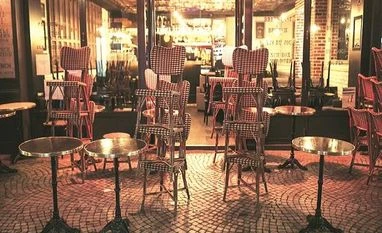Millions across Europe faced greater restrictions on their movement over the weekend, with Italy readying new measures and London and Paris enforcing tighter curbs, in an escalating effort to check the surge in coronavirus cases.
Italian Prime Minister Giuseppe Conte may order bars and restaurants to close at 10 p.m., ban some sporting activities and change the hours for high schools to prevent congestion, according to officials in his government, who asked not to be identified in line with their policy. He is set to announce his plans Sunday night. The country reported a record 11,705 new cases on Sunday, marking the third day cases topped 10,000.
Switzerland will require masks in public indoor spaces effective Monday and gatherings of more than 15 people will be forbidden, President Simonetta Sommaruga said. In London, rules took effect banning people from mixing with other households indoors, while in Paris and eight other French cities, residents are confined to home between 9 p.m. and 6 a.m. for four weeks.
In Belgium, which has the most cases per capita in Europe except for the Czech Republic, the government announced plans for new restrictions nationwide starting Monday. Ireland is set to approve tighter measures on Monday.
With the exception of Belgium, Europe’s leaders have mostly stuck to local restrictions targeted at urban virus hot spots after broad lockdowns earlier this year triggered some of the worst recessions in living memory. But with the region heading into the winter, when people will be unable to spend as much time outdoors and transmission rates are likely to rise, getting back to any sense of normality appears some way off.
Chancellor Sebastian Kurz urged Austrians to curb social contact and observe health measures to avoid a second lockdown in a videotaped message on social media.
“If all of us do without private festivities, large gatherings, parties, we can slow down the spread and keep open schools, the economy, and large parts of social life,” Kurz said.
The increased restrictions come as new cases hit daily records across much of Europe. The U.K. reported almost 17,000 new cases on Sunday and has added more than 100,000 infections in the past week. France reported a record 32,427 infections on Saturday.
Italy’s coalition is divided over the new restrictions. Some in the government are seeking even tougher rules while Conte insists that the outbreak now is much different from what the country faced earlier this year, so the measures should mirror the current situation, Italian media including Il Corriere della Sera reported. Regional leaders are meeting Sunday with some ministers to try and agree on new rules, which Conte will announce later in the day.
Authorities in the Lombardy region, which includes the financial capital of Milan, already on Friday told bars and restaurants to start closing at midnight, suspended gaming, and banned establishments from serving alcohol after 6 p.m. except to patrons seated at tables. Restrictions for high schools and sports events were also announced.
German President Frank-Walter Steinmeier entered quarantine after a bodyguard tested positive for the virus Saturday, a spokeswoman said. Steinmeier has tested negative twice since confirmation of the bodyguard’s infection.
In Belgium, Prime Minister Alexander de Croo said hospitality restrictions, along with a midnight to 5 a.m. curfew and curbs on alcohol sales and gatherings, will take effect Monday for four weeks. Work from home will be mandatory wherever possible. Bars in Brussels were already closed last week.
“By many measures, the numbers are worse than they were in March or April,” De Croo said during a news conference. “And I bring no good message: those numbers will likely keep rising in the coming days.”
Belgium’s experience suggests that the prospect of national shutdowns in growing likelier, even after leaders including U.K. Prime Minister Boris Johnson and French President Emmanuel Macron vowed to do everything possible to keep their economies running.
Ireland’s cabinet is set to approve new measures Monday after health officials recommended moving the entire nation to a Level 5 lockdown, the tightest shutdown, as cases surge to levels last seen in April. While the government may stop just short of a return to a near-total lockdown, among the potential measures in play are closure of non-essential stores, the shuttering of all bars and limits on distances people can travel from home.
In Spain, bars and restaurants have closed down in the Catalonia region around Barcelona, while in Austria, Kurz is attempting to channel what he called the “team spirit” citizens showed during the first wave of infections in the spring. The government has scheduled a meeting with the country’s nine provinces on Monday to decide how to reduce social contacts after the country posted a record increase in new cases Saturday.
“The second wave is here,” said Swiss Interior Minister Alain Berset. “It came on quicker than we expected but we’re ready for it.”
Unlock 30+ premium stories daily hand-picked by our editors, across devices on browser and app.
Pick your 5 favourite companies, get a daily email with all news updates on them.
Full access to our intuitive epaper - clip, save, share articles from any device; newspaper archives from 2006.
Preferential invites to Business Standard events.
Curated newsletters on markets, personal finance, policy & politics, start-ups, technology, and more.
)